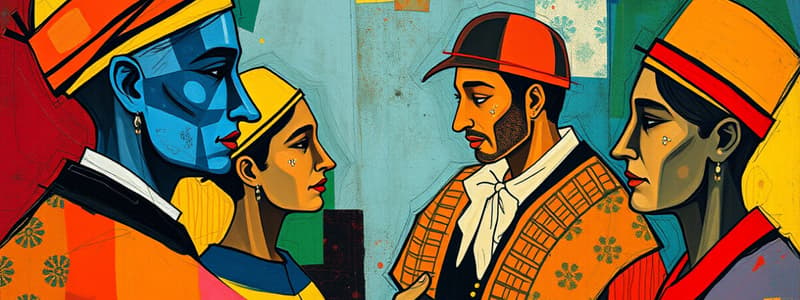Podcast
Questions and Answers
What is the definition of culture?
What is the definition of culture?
- The process of making decisions that affect a group of individuals.
- The collective beliefs, customs, arts, and behaviors of a group or society. (correct)
- The establishment of systems that govern social behavior.
- A structured community of individuals with shared relationships.
Which of the following is NOT a component of culture?
Which of the following is NOT a component of culture?
- Values
- Language
- Norms
- Social Structure (correct)
What are the established systems that govern social behavior known as?
What are the established systems that govern social behavior known as?
- Social institutions (correct)
- Community values
- Political ideologies
- Cultural norms
How does culture influence society?
How does culture influence society?
What is the primary focus of politics?
What is the primary focus of politics?
Which concept represents legitimate power recognized by society?
Which concept represents legitimate power recognized by society?
What does political governance involve?
What does political governance involve?
What effect does social change have on society?
What effect does social change have on society?
Flashcards are hidden until you start studying
Study Notes
Understanding Culture, Society, and Politics
Culture
- Definition: The collective beliefs, customs, arts, and behaviors of a group or society.
- Components:
- Values: Core principles and ideals that guide behavior.
- Norms: Social rules that dictate acceptable behavior.
- Symbols: Objects, gestures, or images that hold particular meanings.
- Language: A system of communication that reflects cultural identity.
Society
- Definition: A structured community of individuals bound by shared culture, institutions, and relationships.
- Characteristics:
- Social Structure: Organization of society into groups (e.g., class, race, gender).
- Institutions: Established systems that govern social behavior (e.g., family, education, religion).
- Social Change: Evolution of societal norms and values over time, influenced by various factors (e.g., technology, globalization).
Politics
- Definition: The process of making decisions that apply to members of a group, often involving power dynamics.
- Key Concepts:
- Power: The ability to influence or control the behavior of people.
- Authority: Legitimate power recognized by society.
- Governance: The manner in which power is exercised in management of a community or organization.
- Political Systems: Structures of governance (e.g., democracy, authoritarianism).
Interconnections
- Culture and Society: Culture shapes social norms and practices, influencing how individuals interact within a society.
- Society and Politics: Political systems are often a reflection of societal values and power structures, which can lead to movements for social change.
- Culture and Politics: Cultural beliefs influence political ideologies and policy-making processes.
Importance of Understanding
- Provides insight into human behavior and social dynamics.
- Promotes awareness of diversity and the complexity of societal issues.
- Helps in analyzing current events and their cultural or political implications.
Culture
- Collective beliefs, customs, arts, and behaviors characterize a group's identity.
- Values serve as core principles guiding actions within a culture.
- Norms dictate what is considered acceptable behavior socially.
- Symbols include objects or gestures that convey specific meanings across cultures.
- Language functions as a communication system, reflecting and reinforcing cultural identity.
Society
- A structured community of individuals sharing culture, institutions, and relationships.
- Social structure organizes individuals into various groups, such as class, race, and gender.
- Institutions like family, education, and religion frame shared social behaviors.
- Social change illustrates the evolution of societal norms influenced by technology and globalization.
Politics
- The decision-making process that affects a group's members, often characterized by power dynamics.
- Power enables individuals or groups to influence or control others' behaviors.
- Authority refers to legitimate power acknowledged within society.
- Governance describes how power is executed in managing communities or organizations.
- Political systems, such as democracy and authoritarianism, define structural governance frameworks.
Interconnections
- Culture significantly shapes social norms and interactions within society.
- Society influences political systems as they reflect societal values and power structures.
- Cultural beliefs play a crucial role in shaping political ideologies and determining policy-making.
Importance of Understanding
- Enhances insight into human behavior and societal dynamics.
- Fosters awareness of diversity and complexity in social issues.
- Aids in analyzing current events with regard to their cultural and political contexts.
Studying That Suits You
Use AI to generate personalized quizzes and flashcards to suit your learning preferences.




